Strategic HRM: Managing an International Workforce
VerifiedAdded on 2024/05/16
|11
|3276
|463
AI Summary
This report explores the challenges and strategies involved in managing an international workforce. It examines the importance of training and development, particularly in the context of language barriers and cultural differences. The report also discusses the role of e-learning, coaching, and mentoring in preparing employees for overseas assignments. Additionally, it highlights the significance of employee well-being, addressing issues related to compensation, cultural adaptation, and potential risks associated with international deployments. The report concludes by emphasizing the need for organizations to prioritize strategic HRM practices to ensure the successful integration and management of a global workforce.
Contribute Materials
Your contribution can guide someone’s learning journey. Share your
documents today.
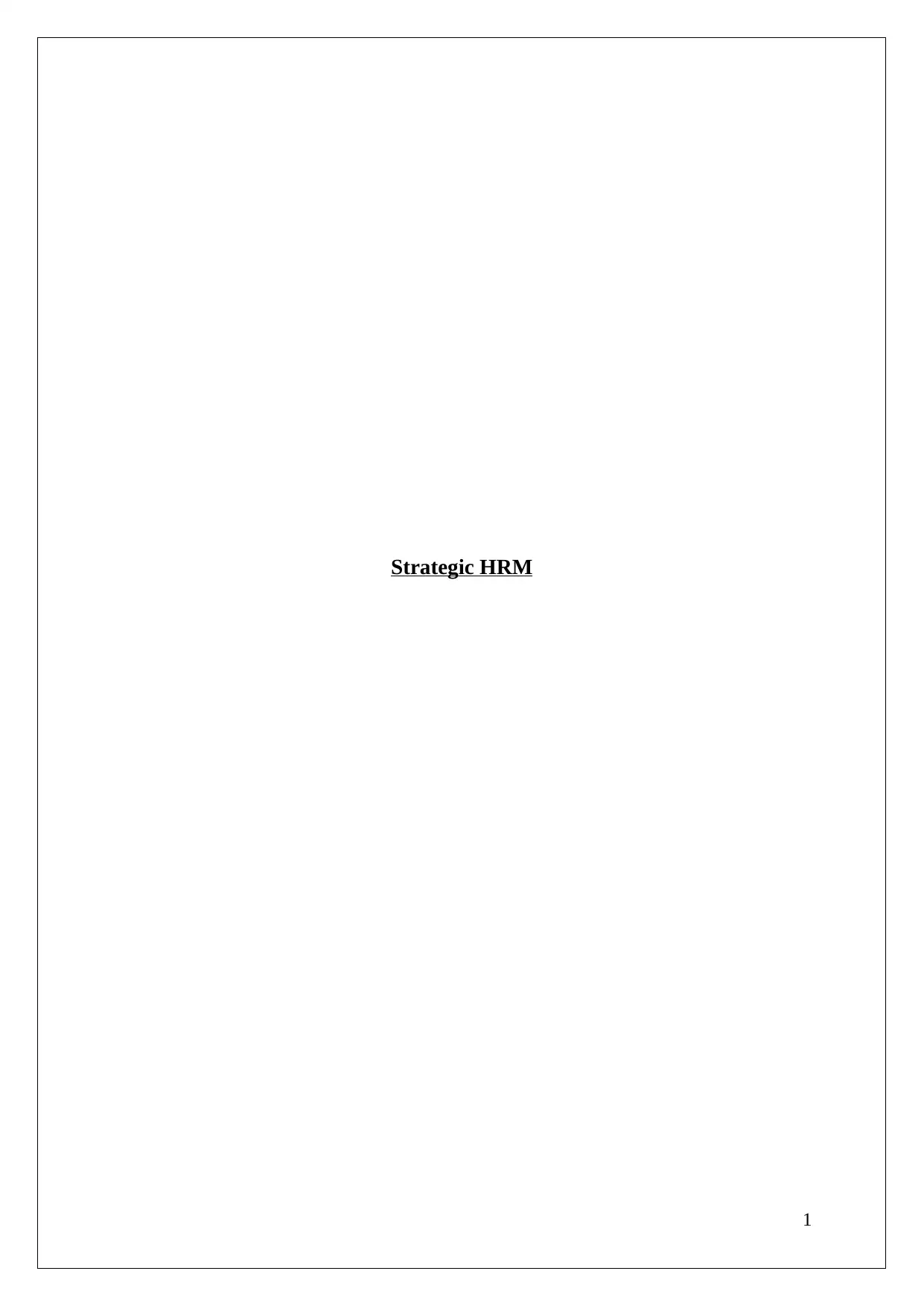
Strategic HRM
1
1
Secure Best Marks with AI Grader
Need help grading? Try our AI Grader for instant feedback on your assignments.
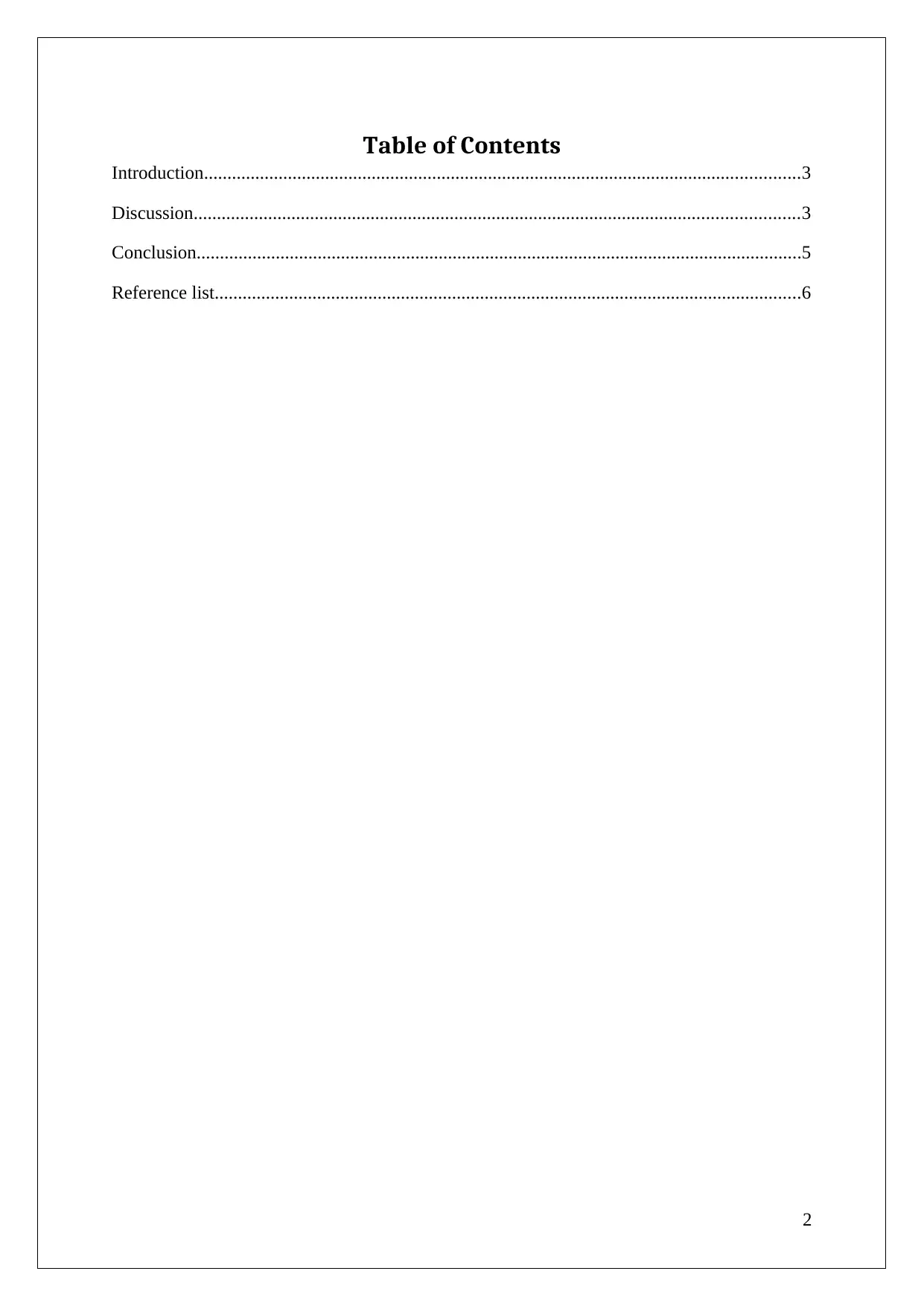
Table of Contents
Introduction................................................................................................................................3
Discussion..................................................................................................................................3
Conclusion..................................................................................................................................5
Reference list..............................................................................................................................6
2
Introduction................................................................................................................................3
Discussion..................................................................................................................................3
Conclusion..................................................................................................................................5
Reference list..............................................................................................................................6
2
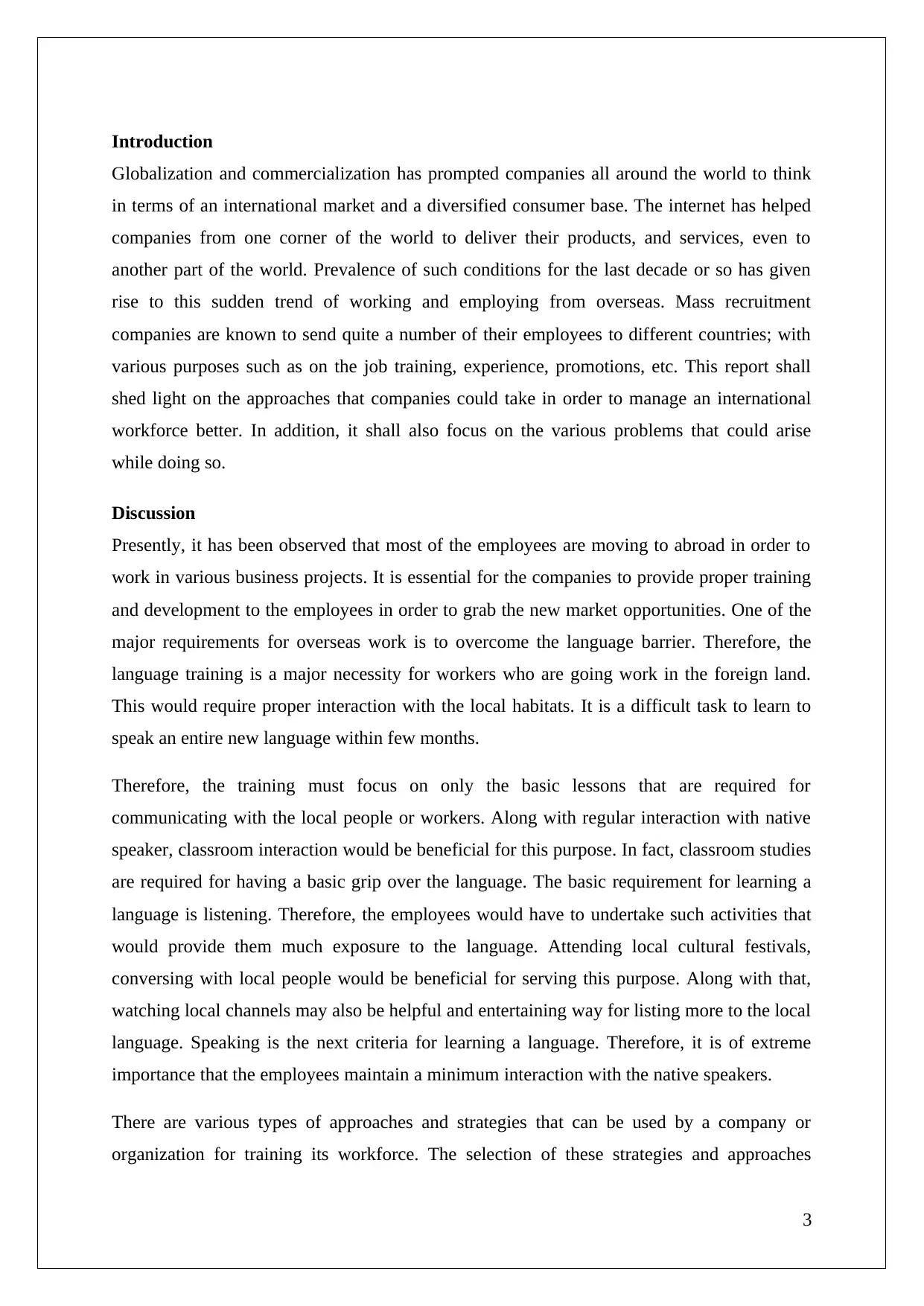
Introduction
Globalization and commercialization has prompted companies all around the world to think
in terms of an international market and a diversified consumer base. The internet has helped
companies from one corner of the world to deliver their products, and services, even to
another part of the world. Prevalence of such conditions for the last decade or so has given
rise to this sudden trend of working and employing from overseas. Mass recruitment
companies are known to send quite a number of their employees to different countries; with
various purposes such as on the job training, experience, promotions, etc. This report shall
shed light on the approaches that companies could take in order to manage an international
workforce better. In addition, it shall also focus on the various problems that could arise
while doing so.
Discussion
Presently, it has been observed that most of the employees are moving to abroad in order to
work in various business projects. It is essential for the companies to provide proper training
and development to the employees in order to grab the new market opportunities. One of the
major requirements for overseas work is to overcome the language barrier. Therefore, the
language training is a major necessity for workers who are going work in the foreign land.
This would require proper interaction with the local habitats. It is a difficult task to learn to
speak an entire new language within few months.
Therefore, the training must focus on only the basic lessons that are required for
communicating with the local people or workers. Along with regular interaction with native
speaker, classroom interaction would be beneficial for this purpose. In fact, classroom studies
are required for having a basic grip over the language. The basic requirement for learning a
language is listening. Therefore, the employees would have to undertake such activities that
would provide them much exposure to the language. Attending local cultural festivals,
conversing with local people would be beneficial for serving this purpose. Along with that,
watching local channels may also be helpful and entertaining way for listing more to the local
language. Speaking is the next criteria for learning a language. Therefore, it is of extreme
importance that the employees maintain a minimum interaction with the native speakers.
There are various types of approaches and strategies that can be used by a company or
organization for training its workforce. The selection of these strategies and approaches
3
Globalization and commercialization has prompted companies all around the world to think
in terms of an international market and a diversified consumer base. The internet has helped
companies from one corner of the world to deliver their products, and services, even to
another part of the world. Prevalence of such conditions for the last decade or so has given
rise to this sudden trend of working and employing from overseas. Mass recruitment
companies are known to send quite a number of their employees to different countries; with
various purposes such as on the job training, experience, promotions, etc. This report shall
shed light on the approaches that companies could take in order to manage an international
workforce better. In addition, it shall also focus on the various problems that could arise
while doing so.
Discussion
Presently, it has been observed that most of the employees are moving to abroad in order to
work in various business projects. It is essential for the companies to provide proper training
and development to the employees in order to grab the new market opportunities. One of the
major requirements for overseas work is to overcome the language barrier. Therefore, the
language training is a major necessity for workers who are going work in the foreign land.
This would require proper interaction with the local habitats. It is a difficult task to learn to
speak an entire new language within few months.
Therefore, the training must focus on only the basic lessons that are required for
communicating with the local people or workers. Along with regular interaction with native
speaker, classroom interaction would be beneficial for this purpose. In fact, classroom studies
are required for having a basic grip over the language. The basic requirement for learning a
language is listening. Therefore, the employees would have to undertake such activities that
would provide them much exposure to the language. Attending local cultural festivals,
conversing with local people would be beneficial for serving this purpose. Along with that,
watching local channels may also be helpful and entertaining way for listing more to the local
language. Speaking is the next criteria for learning a language. Therefore, it is of extreme
importance that the employees maintain a minimum interaction with the native speakers.
There are various types of approaches and strategies that can be used by a company or
organization for training its workforce. The selection of these strategies and approaches
3
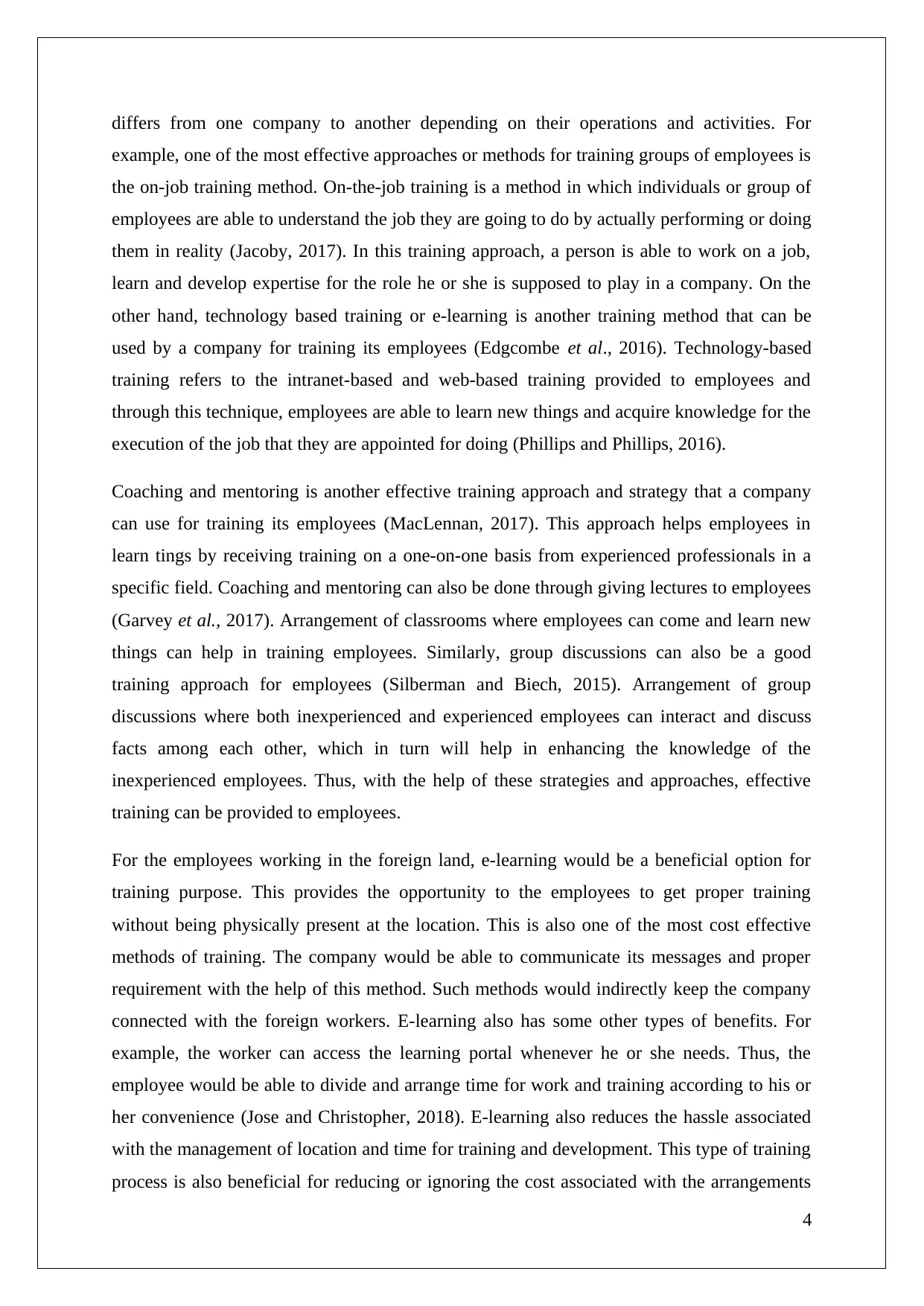
differs from one company to another depending on their operations and activities. For
example, one of the most effective approaches or methods for training groups of employees is
the on-job training method. On-the-job training is a method in which individuals or group of
employees are able to understand the job they are going to do by actually performing or doing
them in reality (Jacoby, 2017). In this training approach, a person is able to work on a job,
learn and develop expertise for the role he or she is supposed to play in a company. On the
other hand, technology based training or e-learning is another training method that can be
used by a company for training its employees (Edgcombe et al., 2016). Technology-based
training refers to the intranet-based and web-based training provided to employees and
through this technique, employees are able to learn new things and acquire knowledge for the
execution of the job that they are appointed for doing (Phillips and Phillips, 2016).
Coaching and mentoring is another effective training approach and strategy that a company
can use for training its employees (MacLennan, 2017). This approach helps employees in
learn tings by receiving training on a one-on-one basis from experienced professionals in a
specific field. Coaching and mentoring can also be done through giving lectures to employees
(Garvey et al., 2017). Arrangement of classrooms where employees can come and learn new
things can help in training employees. Similarly, group discussions can also be a good
training approach for employees (Silberman and Biech, 2015). Arrangement of group
discussions where both inexperienced and experienced employees can interact and discuss
facts among each other, which in turn will help in enhancing the knowledge of the
inexperienced employees. Thus, with the help of these strategies and approaches, effective
training can be provided to employees.
For the employees working in the foreign land, e-learning would be a beneficial option for
training purpose. This provides the opportunity to the employees to get proper training
without being physically present at the location. This is also one of the most cost effective
methods of training. The company would be able to communicate its messages and proper
requirement with the help of this method. Such methods would indirectly keep the company
connected with the foreign workers. E-learning also has some other types of benefits. For
example, the worker can access the learning portal whenever he or she needs. Thus, the
employee would be able to divide and arrange time for work and training according to his or
her convenience (Jose and Christopher, 2018). E-learning also reduces the hassle associated
with the management of location and time for training and development. This type of training
process is also beneficial for reducing or ignoring the cost associated with the arrangements
4
example, one of the most effective approaches or methods for training groups of employees is
the on-job training method. On-the-job training is a method in which individuals or group of
employees are able to understand the job they are going to do by actually performing or doing
them in reality (Jacoby, 2017). In this training approach, a person is able to work on a job,
learn and develop expertise for the role he or she is supposed to play in a company. On the
other hand, technology based training or e-learning is another training method that can be
used by a company for training its employees (Edgcombe et al., 2016). Technology-based
training refers to the intranet-based and web-based training provided to employees and
through this technique, employees are able to learn new things and acquire knowledge for the
execution of the job that they are appointed for doing (Phillips and Phillips, 2016).
Coaching and mentoring is another effective training approach and strategy that a company
can use for training its employees (MacLennan, 2017). This approach helps employees in
learn tings by receiving training on a one-on-one basis from experienced professionals in a
specific field. Coaching and mentoring can also be done through giving lectures to employees
(Garvey et al., 2017). Arrangement of classrooms where employees can come and learn new
things can help in training employees. Similarly, group discussions can also be a good
training approach for employees (Silberman and Biech, 2015). Arrangement of group
discussions where both inexperienced and experienced employees can interact and discuss
facts among each other, which in turn will help in enhancing the knowledge of the
inexperienced employees. Thus, with the help of these strategies and approaches, effective
training can be provided to employees.
For the employees working in the foreign land, e-learning would be a beneficial option for
training purpose. This provides the opportunity to the employees to get proper training
without being physically present at the location. This is also one of the most cost effective
methods of training. The company would be able to communicate its messages and proper
requirement with the help of this method. Such methods would indirectly keep the company
connected with the foreign workers. E-learning also has some other types of benefits. For
example, the worker can access the learning portal whenever he or she needs. Thus, the
employee would be able to divide and arrange time for work and training according to his or
her convenience (Jose and Christopher, 2018). E-learning also reduces the hassle associated
with the management of location and time for training and development. This type of training
process is also beneficial for reducing or ignoring the cost associated with the arrangements
4
Paraphrase This Document
Need a fresh take? Get an instant paraphrase of this document with our AI Paraphraser
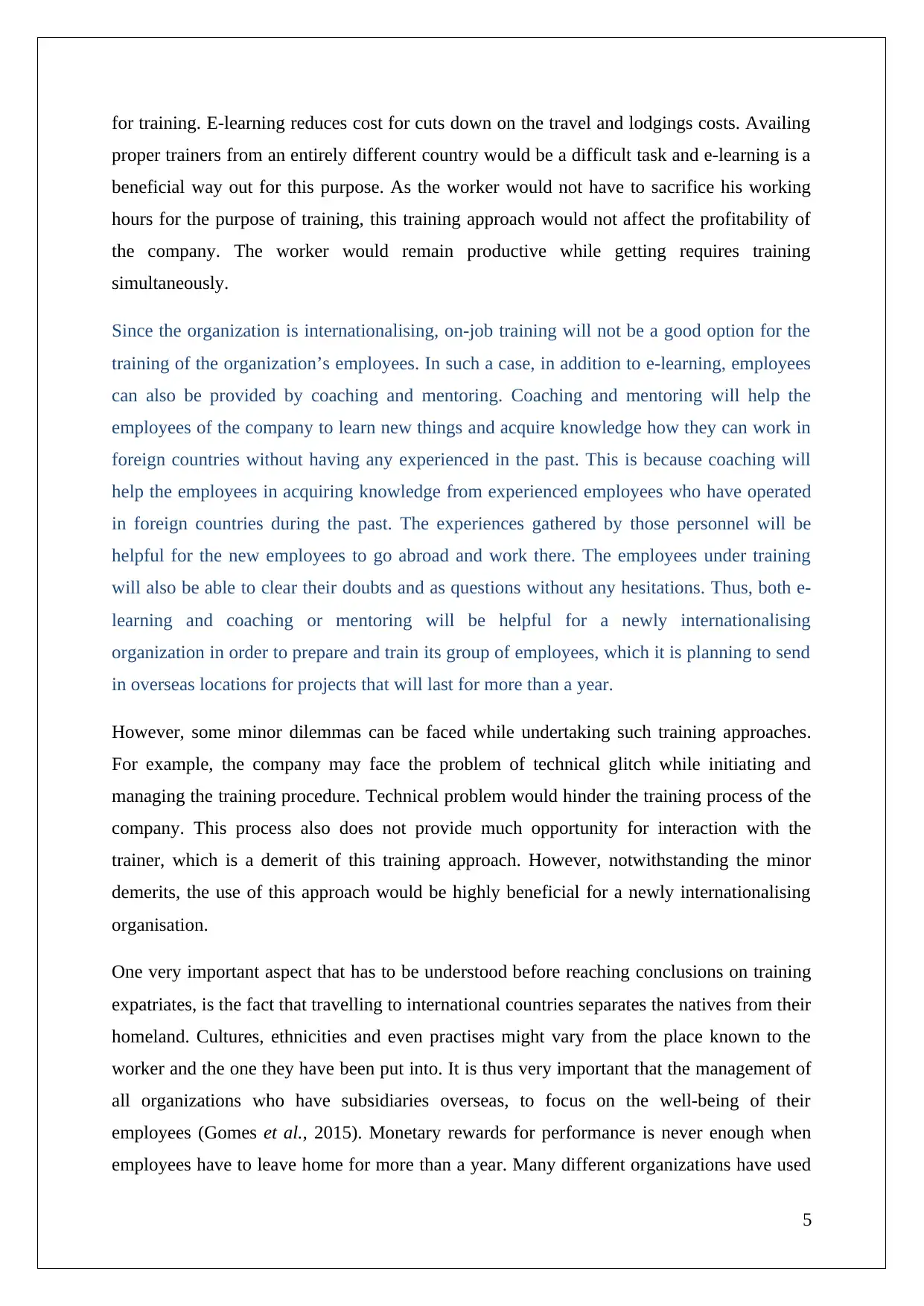
for training. E-learning reduces cost for cuts down on the travel and lodgings costs. Availing
proper trainers from an entirely different country would be a difficult task and e-learning is a
beneficial way out for this purpose. As the worker would not have to sacrifice his working
hours for the purpose of training, this training approach would not affect the profitability of
the company. The worker would remain productive while getting requires training
simultaneously.
Since the organization is internationalising, on-job training will not be a good option for the
training of the organization’s employees. In such a case, in addition to e-learning, employees
can also be provided by coaching and mentoring. Coaching and mentoring will help the
employees of the company to learn new things and acquire knowledge how they can work in
foreign countries without having any experienced in the past. This is because coaching will
help the employees in acquiring knowledge from experienced employees who have operated
in foreign countries during the past. The experiences gathered by those personnel will be
helpful for the new employees to go abroad and work there. The employees under training
will also be able to clear their doubts and as questions without any hesitations. Thus, both e-
learning and coaching or mentoring will be helpful for a newly internationalising
organization in order to prepare and train its group of employees, which it is planning to send
in overseas locations for projects that will last for more than a year.
However, some minor dilemmas can be faced while undertaking such training approaches.
For example, the company may face the problem of technical glitch while initiating and
managing the training procedure. Technical problem would hinder the training process of the
company. This process also does not provide much opportunity for interaction with the
trainer, which is a demerit of this training approach. However, notwithstanding the minor
demerits, the use of this approach would be highly beneficial for a newly internationalising
organisation.
One very important aspect that has to be understood before reaching conclusions on training
expatriates, is the fact that travelling to international countries separates the natives from their
homeland. Cultures, ethnicities and even practises might vary from the place known to the
worker and the one they have been put into. It is thus very important that the management of
all organizations who have subsidiaries overseas, to focus on the well-being of their
employees (Gomes et al., 2015). Monetary rewards for performance is never enough when
employees have to leave home for more than a year. Many different organizations have used
5
proper trainers from an entirely different country would be a difficult task and e-learning is a
beneficial way out for this purpose. As the worker would not have to sacrifice his working
hours for the purpose of training, this training approach would not affect the profitability of
the company. The worker would remain productive while getting requires training
simultaneously.
Since the organization is internationalising, on-job training will not be a good option for the
training of the organization’s employees. In such a case, in addition to e-learning, employees
can also be provided by coaching and mentoring. Coaching and mentoring will help the
employees of the company to learn new things and acquire knowledge how they can work in
foreign countries without having any experienced in the past. This is because coaching will
help the employees in acquiring knowledge from experienced employees who have operated
in foreign countries during the past. The experiences gathered by those personnel will be
helpful for the new employees to go abroad and work there. The employees under training
will also be able to clear their doubts and as questions without any hesitations. Thus, both e-
learning and coaching or mentoring will be helpful for a newly internationalising
organization in order to prepare and train its group of employees, which it is planning to send
in overseas locations for projects that will last for more than a year.
However, some minor dilemmas can be faced while undertaking such training approaches.
For example, the company may face the problem of technical glitch while initiating and
managing the training procedure. Technical problem would hinder the training process of the
company. This process also does not provide much opportunity for interaction with the
trainer, which is a demerit of this training approach. However, notwithstanding the minor
demerits, the use of this approach would be highly beneficial for a newly internationalising
organisation.
One very important aspect that has to be understood before reaching conclusions on training
expatriates, is the fact that travelling to international countries separates the natives from their
homeland. Cultures, ethnicities and even practises might vary from the place known to the
worker and the one they have been put into. It is thus very important that the management of
all organizations who have subsidiaries overseas, to focus on the well-being of their
employees (Gomes et al., 2015). Monetary rewards for performance is never enough when
employees have to leave home for more than a year. Many different organizations have used
5
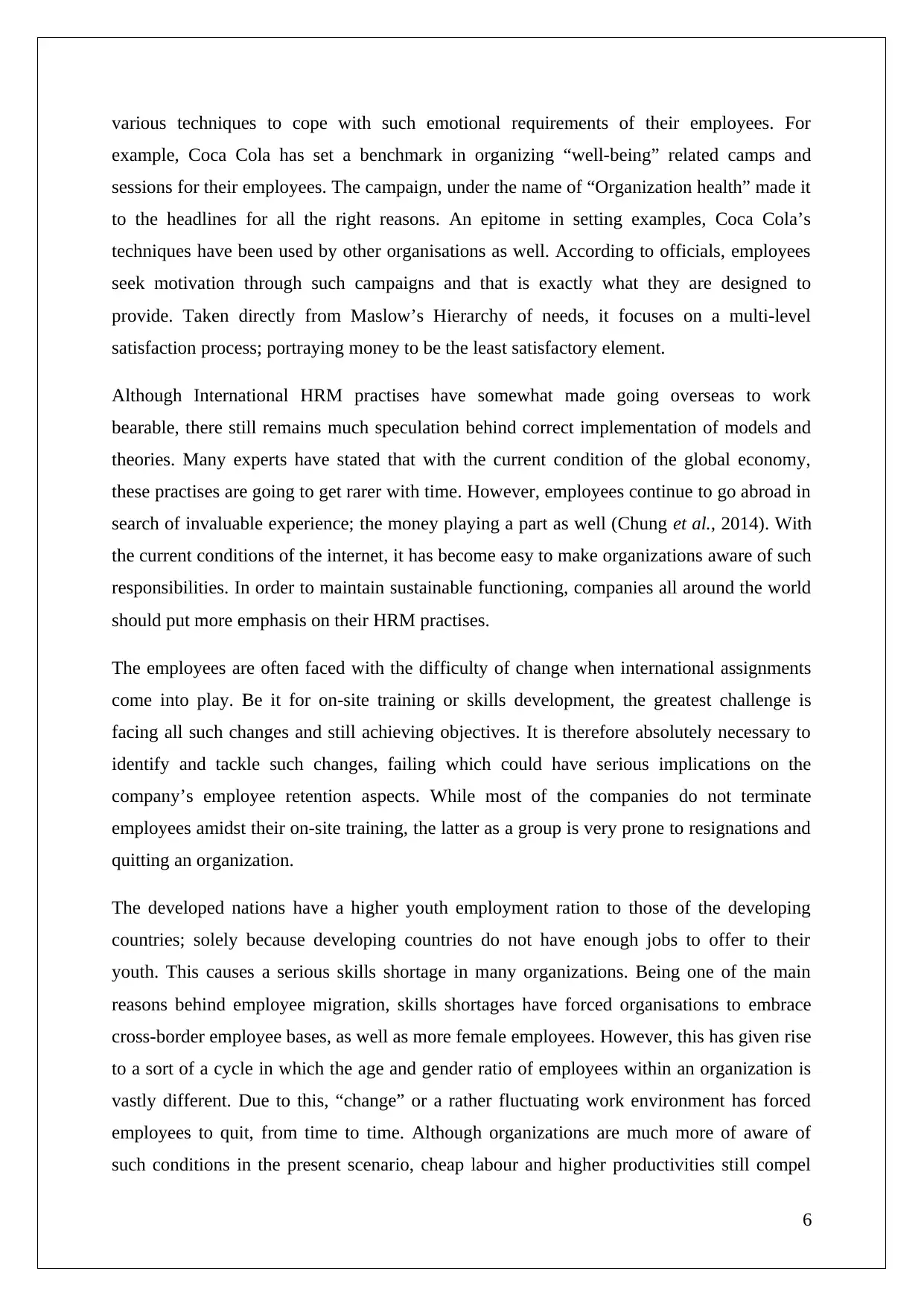
various techniques to cope with such emotional requirements of their employees. For
example, Coca Cola has set a benchmark in organizing “well-being” related camps and
sessions for their employees. The campaign, under the name of “Organization health” made it
to the headlines for all the right reasons. An epitome in setting examples, Coca Cola’s
techniques have been used by other organisations as well. According to officials, employees
seek motivation through such campaigns and that is exactly what they are designed to
provide. Taken directly from Maslow’s Hierarchy of needs, it focuses on a multi-level
satisfaction process; portraying money to be the least satisfactory element.
Although International HRM practises have somewhat made going overseas to work
bearable, there still remains much speculation behind correct implementation of models and
theories. Many experts have stated that with the current condition of the global economy,
these practises are going to get rarer with time. However, employees continue to go abroad in
search of invaluable experience; the money playing a part as well (Chung et al., 2014). With
the current conditions of the internet, it has become easy to make organizations aware of such
responsibilities. In order to maintain sustainable functioning, companies all around the world
should put more emphasis on their HRM practises.
The employees are often faced with the difficulty of change when international assignments
come into play. Be it for on-site training or skills development, the greatest challenge is
facing all such changes and still achieving objectives. It is therefore absolutely necessary to
identify and tackle such changes, failing which could have serious implications on the
company’s employee retention aspects. While most of the companies do not terminate
employees amidst their on-site training, the latter as a group is very prone to resignations and
quitting an organization.
The developed nations have a higher youth employment ration to those of the developing
countries; solely because developing countries do not have enough jobs to offer to their
youth. This causes a serious skills shortage in many organizations. Being one of the main
reasons behind employee migration, skills shortages have forced organisations to embrace
cross-border employee bases, as well as more female employees. However, this has given rise
to a sort of a cycle in which the age and gender ratio of employees within an organization is
vastly different. Due to this, “change” or a rather fluctuating work environment has forced
employees to quit, from time to time. Although organizations are much more of aware of
such conditions in the present scenario, cheap labour and higher productivities still compel
6
example, Coca Cola has set a benchmark in organizing “well-being” related camps and
sessions for their employees. The campaign, under the name of “Organization health” made it
to the headlines for all the right reasons. An epitome in setting examples, Coca Cola’s
techniques have been used by other organisations as well. According to officials, employees
seek motivation through such campaigns and that is exactly what they are designed to
provide. Taken directly from Maslow’s Hierarchy of needs, it focuses on a multi-level
satisfaction process; portraying money to be the least satisfactory element.
Although International HRM practises have somewhat made going overseas to work
bearable, there still remains much speculation behind correct implementation of models and
theories. Many experts have stated that with the current condition of the global economy,
these practises are going to get rarer with time. However, employees continue to go abroad in
search of invaluable experience; the money playing a part as well (Chung et al., 2014). With
the current conditions of the internet, it has become easy to make organizations aware of such
responsibilities. In order to maintain sustainable functioning, companies all around the world
should put more emphasis on their HRM practises.
The employees are often faced with the difficulty of change when international assignments
come into play. Be it for on-site training or skills development, the greatest challenge is
facing all such changes and still achieving objectives. It is therefore absolutely necessary to
identify and tackle such changes, failing which could have serious implications on the
company’s employee retention aspects. While most of the companies do not terminate
employees amidst their on-site training, the latter as a group is very prone to resignations and
quitting an organization.
The developed nations have a higher youth employment ration to those of the developing
countries; solely because developing countries do not have enough jobs to offer to their
youth. This causes a serious skills shortage in many organizations. Being one of the main
reasons behind employee migration, skills shortages have forced organisations to embrace
cross-border employee bases, as well as more female employees. However, this has given rise
to a sort of a cycle in which the age and gender ratio of employees within an organization is
vastly different. Due to this, “change” or a rather fluctuating work environment has forced
employees to quit, from time to time. Although organizations are much more of aware of
such conditions in the present scenario, cheap labour and higher productivities still compel
6
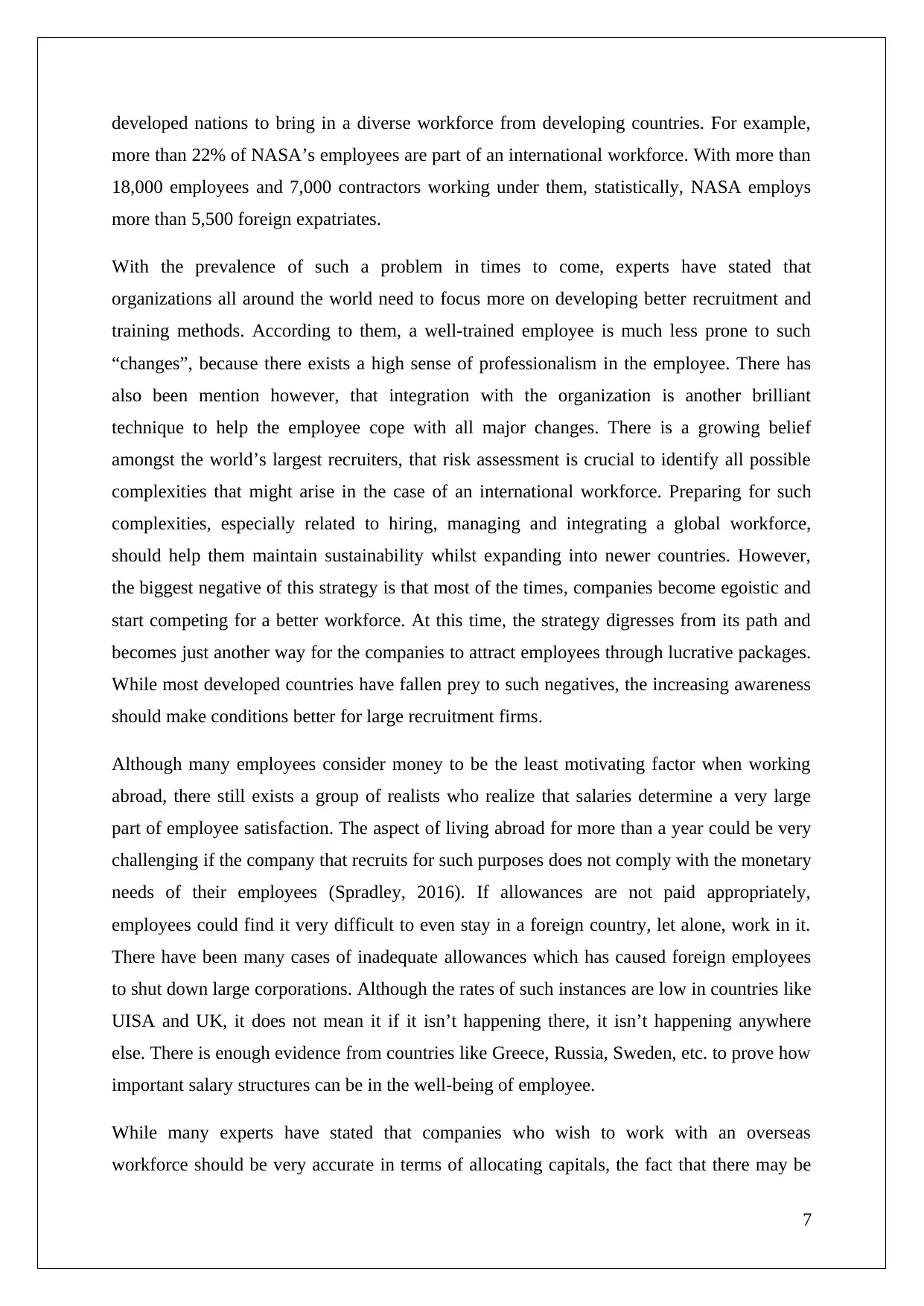
developed nations to bring in a diverse workforce from developing countries. For example,
more than 22% of NASA’s employees are part of an international workforce. With more than
18,000 employees and 7,000 contractors working under them, statistically, NASA employs
more than 5,500 foreign expatriates.
With the prevalence of such a problem in times to come, experts have stated that
organizations all around the world need to focus more on developing better recruitment and
training methods. According to them, a well-trained employee is much less prone to such
“changes”, because there exists a high sense of professionalism in the employee. There has
also been mention however, that integration with the organization is another brilliant
technique to help the employee cope with all major changes. There is a growing belief
amongst the world’s largest recruiters, that risk assessment is crucial to identify all possible
complexities that might arise in the case of an international workforce. Preparing for such
complexities, especially related to hiring, managing and integrating a global workforce,
should help them maintain sustainability whilst expanding into newer countries. However,
the biggest negative of this strategy is that most of the times, companies become egoistic and
start competing for a better workforce. At this time, the strategy digresses from its path and
becomes just another way for the companies to attract employees through lucrative packages.
While most developed countries have fallen prey to such negatives, the increasing awareness
should make conditions better for large recruitment firms.
Although many employees consider money to be the least motivating factor when working
abroad, there still exists a group of realists who realize that salaries determine a very large
part of employee satisfaction. The aspect of living abroad for more than a year could be very
challenging if the company that recruits for such purposes does not comply with the monetary
needs of their employees (Spradley, 2016). If allowances are not paid appropriately,
employees could find it very difficult to even stay in a foreign country, let alone, work in it.
There have been many cases of inadequate allowances which has caused foreign employees
to shut down large corporations. Although the rates of such instances are low in countries like
UISA and UK, it does not mean it if it isn’t happening there, it isn’t happening anywhere
else. There is enough evidence from countries like Greece, Russia, Sweden, etc. to prove how
important salary structures can be in the well-being of employee.
While many experts have stated that companies who wish to work with an overseas
workforce should be very accurate in terms of allocating capitals, the fact that there may be
7
more than 22% of NASA’s employees are part of an international workforce. With more than
18,000 employees and 7,000 contractors working under them, statistically, NASA employs
more than 5,500 foreign expatriates.
With the prevalence of such a problem in times to come, experts have stated that
organizations all around the world need to focus more on developing better recruitment and
training methods. According to them, a well-trained employee is much less prone to such
“changes”, because there exists a high sense of professionalism in the employee. There has
also been mention however, that integration with the organization is another brilliant
technique to help the employee cope with all major changes. There is a growing belief
amongst the world’s largest recruiters, that risk assessment is crucial to identify all possible
complexities that might arise in the case of an international workforce. Preparing for such
complexities, especially related to hiring, managing and integrating a global workforce,
should help them maintain sustainability whilst expanding into newer countries. However,
the biggest negative of this strategy is that most of the times, companies become egoistic and
start competing for a better workforce. At this time, the strategy digresses from its path and
becomes just another way for the companies to attract employees through lucrative packages.
While most developed countries have fallen prey to such negatives, the increasing awareness
should make conditions better for large recruitment firms.
Although many employees consider money to be the least motivating factor when working
abroad, there still exists a group of realists who realize that salaries determine a very large
part of employee satisfaction. The aspect of living abroad for more than a year could be very
challenging if the company that recruits for such purposes does not comply with the monetary
needs of their employees (Spradley, 2016). If allowances are not paid appropriately,
employees could find it very difficult to even stay in a foreign country, let alone, work in it.
There have been many cases of inadequate allowances which has caused foreign employees
to shut down large corporations. Although the rates of such instances are low in countries like
UISA and UK, it does not mean it if it isn’t happening there, it isn’t happening anywhere
else. There is enough evidence from countries like Greece, Russia, Sweden, etc. to prove how
important salary structures can be in the well-being of employee.
While many experts have stated that companies who wish to work with an overseas
workforce should be very accurate in terms of allocating capitals, the fact that there may be
7
Secure Best Marks with AI Grader
Need help grading? Try our AI Grader for instant feedback on your assignments.
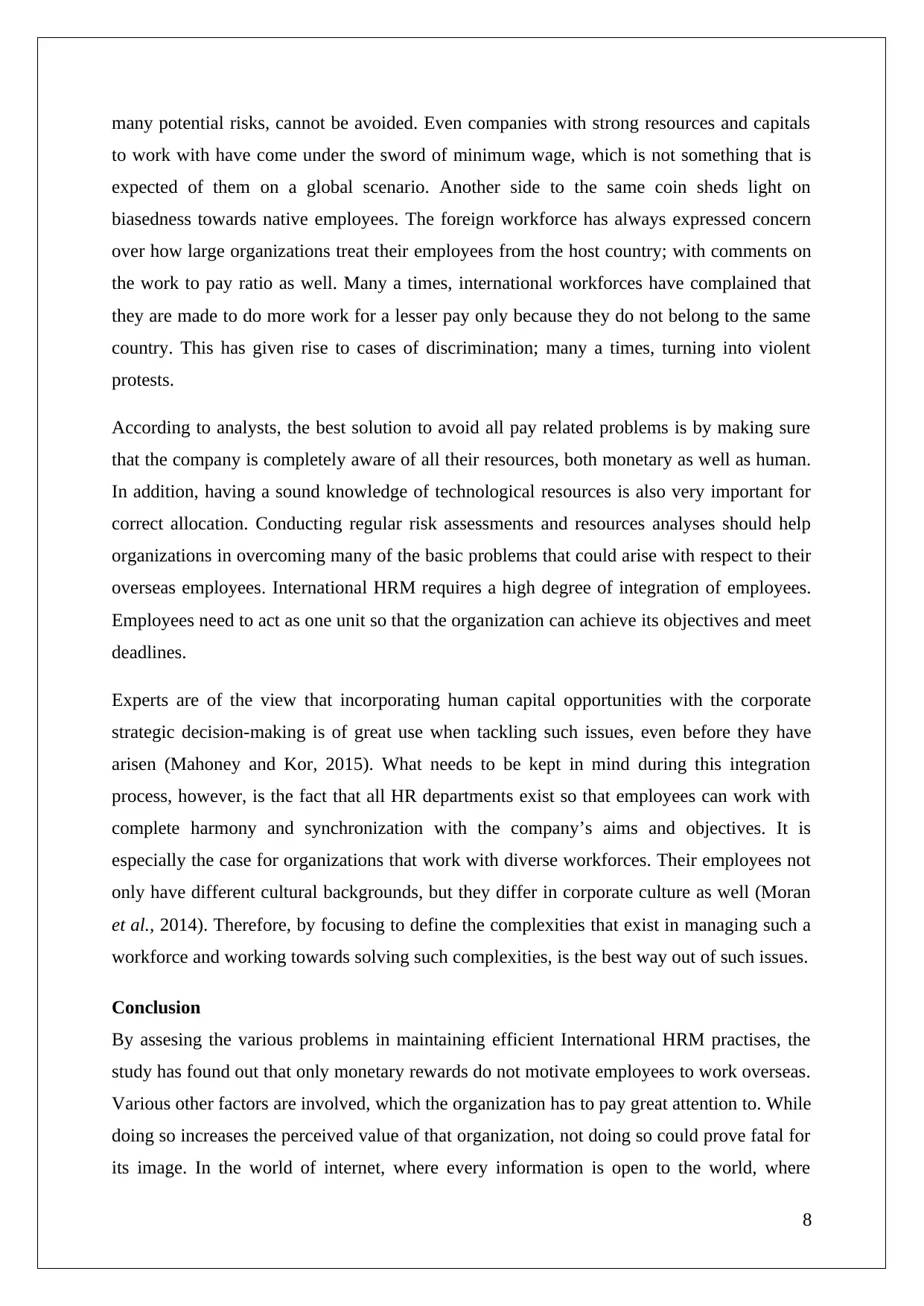
many potential risks, cannot be avoided. Even companies with strong resources and capitals
to work with have come under the sword of minimum wage, which is not something that is
expected of them on a global scenario. Another side to the same coin sheds light on
biasedness towards native employees. The foreign workforce has always expressed concern
over how large organizations treat their employees from the host country; with comments on
the work to pay ratio as well. Many a times, international workforces have complained that
they are made to do more work for a lesser pay only because they do not belong to the same
country. This has given rise to cases of discrimination; many a times, turning into violent
protests.
According to analysts, the best solution to avoid all pay related problems is by making sure
that the company is completely aware of all their resources, both monetary as well as human.
In addition, having a sound knowledge of technological resources is also very important for
correct allocation. Conducting regular risk assessments and resources analyses should help
organizations in overcoming many of the basic problems that could arise with respect to their
overseas employees. International HRM requires a high degree of integration of employees.
Employees need to act as one unit so that the organization can achieve its objectives and meet
deadlines.
Experts are of the view that incorporating human capital opportunities with the corporate
strategic decision-making is of great use when tackling such issues, even before they have
arisen (Mahoney and Kor, 2015). What needs to be kept in mind during this integration
process, however, is the fact that all HR departments exist so that employees can work with
complete harmony and synchronization with the company’s aims and objectives. It is
especially the case for organizations that work with diverse workforces. Their employees not
only have different cultural backgrounds, but they differ in corporate culture as well (Moran
et al., 2014). Therefore, by focusing to define the complexities that exist in managing such a
workforce and working towards solving such complexities, is the best way out of such issues.
Conclusion
By assesing the various problems in maintaining efficient International HRM practises, the
study has found out that only monetary rewards do not motivate employees to work overseas.
Various other factors are involved, which the organization has to pay great attention to. While
doing so increases the perceived value of that organization, not doing so could prove fatal for
its image. In the world of internet, where every information is open to the world, where
8
to work with have come under the sword of minimum wage, which is not something that is
expected of them on a global scenario. Another side to the same coin sheds light on
biasedness towards native employees. The foreign workforce has always expressed concern
over how large organizations treat their employees from the host country; with comments on
the work to pay ratio as well. Many a times, international workforces have complained that
they are made to do more work for a lesser pay only because they do not belong to the same
country. This has given rise to cases of discrimination; many a times, turning into violent
protests.
According to analysts, the best solution to avoid all pay related problems is by making sure
that the company is completely aware of all their resources, both monetary as well as human.
In addition, having a sound knowledge of technological resources is also very important for
correct allocation. Conducting regular risk assessments and resources analyses should help
organizations in overcoming many of the basic problems that could arise with respect to their
overseas employees. International HRM requires a high degree of integration of employees.
Employees need to act as one unit so that the organization can achieve its objectives and meet
deadlines.
Experts are of the view that incorporating human capital opportunities with the corporate
strategic decision-making is of great use when tackling such issues, even before they have
arisen (Mahoney and Kor, 2015). What needs to be kept in mind during this integration
process, however, is the fact that all HR departments exist so that employees can work with
complete harmony and synchronization with the company’s aims and objectives. It is
especially the case for organizations that work with diverse workforces. Their employees not
only have different cultural backgrounds, but they differ in corporate culture as well (Moran
et al., 2014). Therefore, by focusing to define the complexities that exist in managing such a
workforce and working towards solving such complexities, is the best way out of such issues.
Conclusion
By assesing the various problems in maintaining efficient International HRM practises, the
study has found out that only monetary rewards do not motivate employees to work overseas.
Various other factors are involved, which the organization has to pay great attention to. While
doing so increases the perceived value of that organization, not doing so could prove fatal for
its image. In the world of internet, where every information is open to the world, where
8
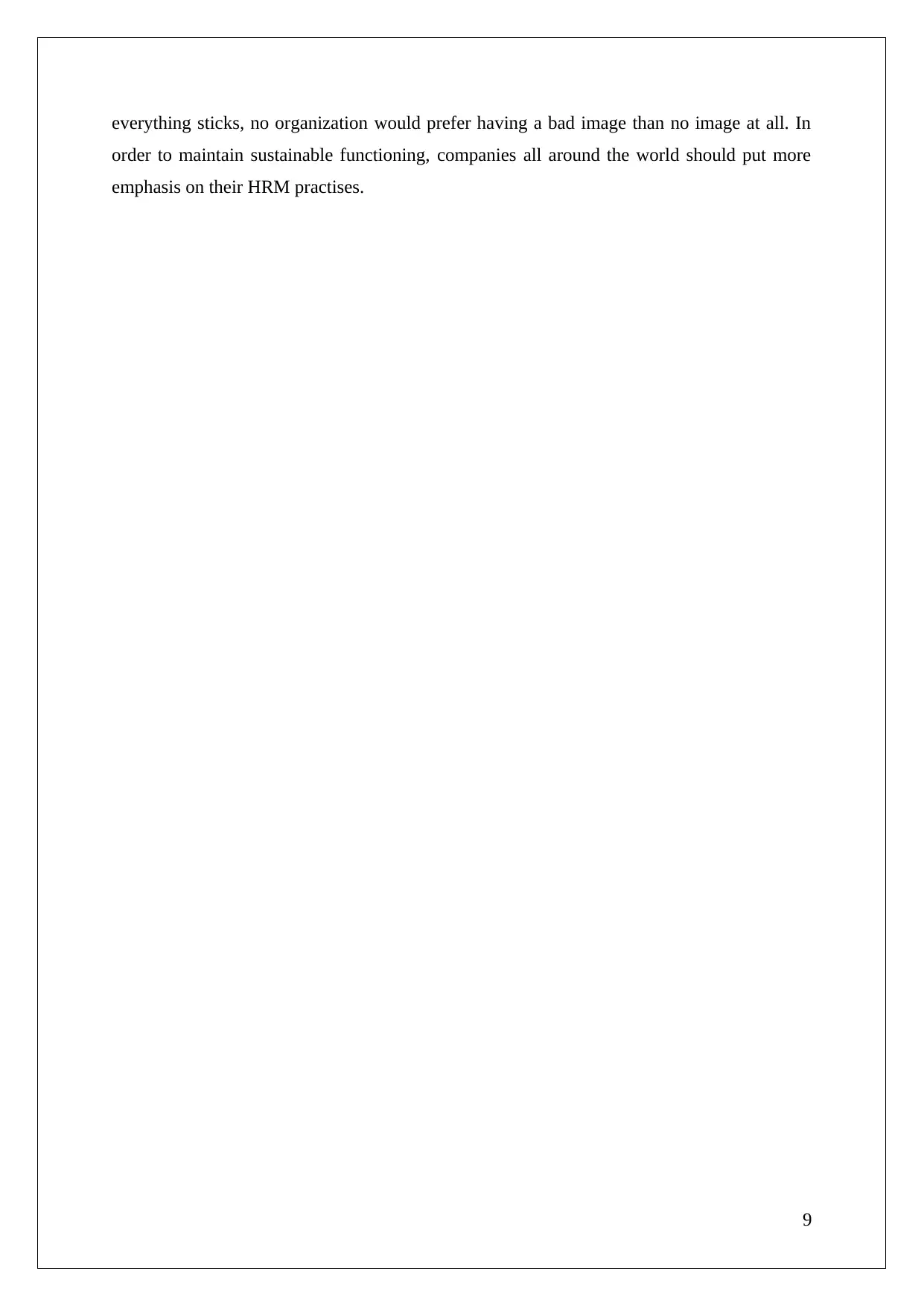
everything sticks, no organization would prefer having a bad image than no image at all. In
order to maintain sustainable functioning, companies all around the world should put more
emphasis on their HRM practises.
9
order to maintain sustainable functioning, companies all around the world should put more
emphasis on their HRM practises.
9
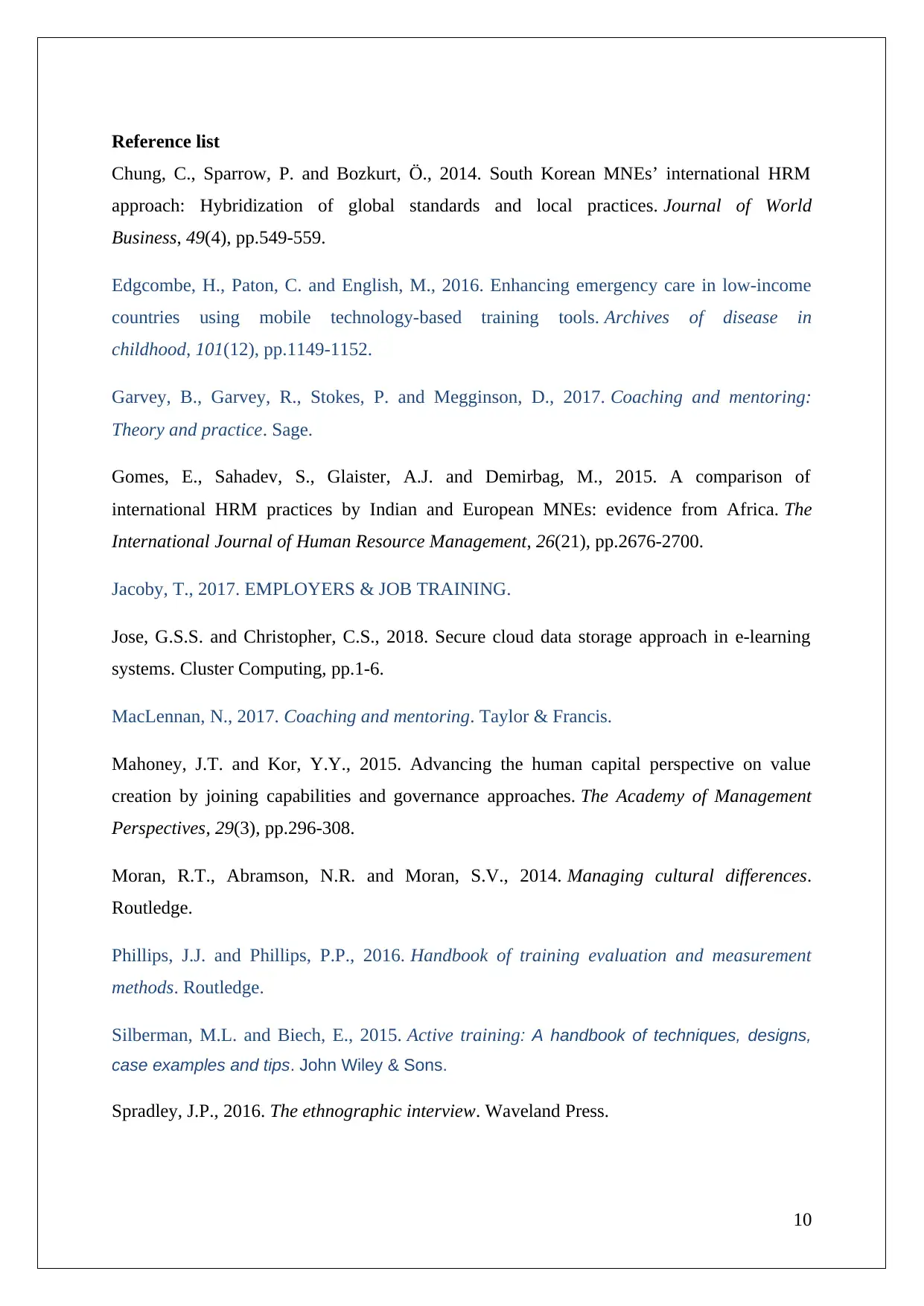
Reference list
Chung, C., Sparrow, P. and Bozkurt, Ö., 2014. South Korean MNEs’ international HRM
approach: Hybridization of global standards and local practices. Journal of World
Business, 49(4), pp.549-559.
Edgcombe, H., Paton, C. and English, M., 2016. Enhancing emergency care in low-income
countries using mobile technology-based training tools. Archives of disease in
childhood, 101(12), pp.1149-1152.
Garvey, B., Garvey, R., Stokes, P. and Megginson, D., 2017. Coaching and mentoring:
Theory and practice. Sage.
Gomes, E., Sahadev, S., Glaister, A.J. and Demirbag, M., 2015. A comparison of
international HRM practices by Indian and European MNEs: evidence from Africa. The
International Journal of Human Resource Management, 26(21), pp.2676-2700.
Jacoby, T., 2017. EMPLOYERS & JOB TRAINING.
Jose, G.S.S. and Christopher, C.S., 2018. Secure cloud data storage approach in e-learning
systems. Cluster Computing, pp.1-6.
MacLennan, N., 2017. Coaching and mentoring. Taylor & Francis.
Mahoney, J.T. and Kor, Y.Y., 2015. Advancing the human capital perspective on value
creation by joining capabilities and governance approaches. The Academy of Management
Perspectives, 29(3), pp.296-308.
Moran, R.T., Abramson, N.R. and Moran, S.V., 2014. Managing cultural differences.
Routledge.
Phillips, J.J. and Phillips, P.P., 2016. Handbook of training evaluation and measurement
methods. Routledge.
Silberman, M.L. and Biech, E., 2015. Active training: A handbook of techniques, designs,
case examples and tips. John Wiley & Sons.
Spradley, J.P., 2016. The ethnographic interview. Waveland Press.
10
Chung, C., Sparrow, P. and Bozkurt, Ö., 2014. South Korean MNEs’ international HRM
approach: Hybridization of global standards and local practices. Journal of World
Business, 49(4), pp.549-559.
Edgcombe, H., Paton, C. and English, M., 2016. Enhancing emergency care in low-income
countries using mobile technology-based training tools. Archives of disease in
childhood, 101(12), pp.1149-1152.
Garvey, B., Garvey, R., Stokes, P. and Megginson, D., 2017. Coaching and mentoring:
Theory and practice. Sage.
Gomes, E., Sahadev, S., Glaister, A.J. and Demirbag, M., 2015. A comparison of
international HRM practices by Indian and European MNEs: evidence from Africa. The
International Journal of Human Resource Management, 26(21), pp.2676-2700.
Jacoby, T., 2017. EMPLOYERS & JOB TRAINING.
Jose, G.S.S. and Christopher, C.S., 2018. Secure cloud data storage approach in e-learning
systems. Cluster Computing, pp.1-6.
MacLennan, N., 2017. Coaching and mentoring. Taylor & Francis.
Mahoney, J.T. and Kor, Y.Y., 2015. Advancing the human capital perspective on value
creation by joining capabilities and governance approaches. The Academy of Management
Perspectives, 29(3), pp.296-308.
Moran, R.T., Abramson, N.R. and Moran, S.V., 2014. Managing cultural differences.
Routledge.
Phillips, J.J. and Phillips, P.P., 2016. Handbook of training evaluation and measurement
methods. Routledge.
Silberman, M.L. and Biech, E., 2015. Active training: A handbook of techniques, designs,
case examples and tips. John Wiley & Sons.
Spradley, J.P., 2016. The ethnographic interview. Waveland Press.
10
Paraphrase This Document
Need a fresh take? Get an instant paraphrase of this document with our AI Paraphraser

11
1 out of 11
![[object Object]](/_next/static/media/star-bottom.7253800d.svg)





